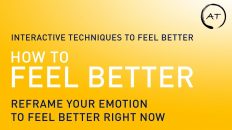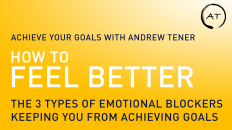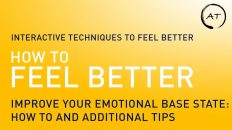If there is one thing I recommend outside of emotional understanding techniques, it is mindfulness meditation. Mindfulness can supercharge the progress you make in your emotional understanding practice. This means practicing mindfulness will make you feel happier faster.
So what is mindfulness, and what are its benefits? And, equally importantly, how do you practice mindfulness?
Mindfulness meditation sounds fancy, but it’s really, really simple. Mindfulness is simply focusing your attention on something. It’s really that easy. You can practice mindfulness doing anything at any time.
Here is an example of formal meditation:
- Focus on your breathing. As you breathe in, mentally tell yourself “in.” As you breathe out, mentally tell yourself “out.”
- When you catch yourself thinking about something, bring your attention back to your breath and refocus on your breathing.
- Continue for five to ninety minutes.
You can do formal meditation any way. Some people don’t want to focus on breathing. Some alternative to focus on are:
- Counting
- The sounds around you
- The feelings in your body
- Walking and each step you take
- Reciting the alphabet
- Eating each bite of your lunch
Meditation is super easy. There are no “right” or “wrong” ways to meditate. The best way to meditate is the way that works for you and keeps you meditating.
The deceptively simple process of mindfulness meditation powerfully transforms your brain. Doing a quick web search will shower you with scientific research espousing the benefits of mindfulness.
Basically, mindfulness strengthens your willpower and focus. Your brain is like a muscle. Because you are concentrating on something during meditation, your concentration “muscle” gets stronger. Not only that, but when you get distracted and fall into thoughts, you will refocus on your breathing/counting/whatever. In the moment that you refocus, you are telling your mind that your thoughts are not urgent. This lessens the impact thoughts have on your concentration and distances you from your thoughts. You will be able to see your thoughts and evaluate whether or not they are useful and true.
When your thoughts lose their power over you, you can begin to live more deliberately and react to thoughts more appropriately.
Mediation offers 3 transformative benefits when combined with practicing emotional understanding:
- Emotions lessen their hold on you. This allows you to more easily examine the difficult and painful feelings you have because you will understand the feelings cannot hurt you. This lets you make progress on your most painful emotions and open up new areas of your life.
- You will be able to better concentrate on feeling your emotions and honing in on your memories. You will spend less time searching for feelings and memories. This means you will be releasing memories faster and healing yourself more each session.
- You will gain perspective around your emotions. Because they will not hold your mind so tightly, you will be able to evaluate your feelings at a distance. This will let you understand your emotions more easily and more quickly. So you will be able to release your emotions much faster.
In short, emotional understanding makes you feel better. Emotional understanding plus mindfulness makes you feel better faster. I believe you deserve to be truly happy right now. That’s why I suggest that you add five to forty-five minutes of mindfulness to your daily routine.
One more thing. The harder mindfulness is for you, the more you are benefitting from it. It’s like how people who are new to the gym make fast progress. So if you don’t like meditation, I strongly urge you to do it. I promise it’s worth five minutes a day!
Cheers!
Andrew


